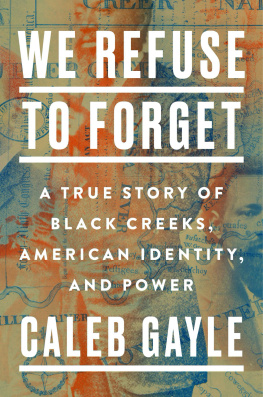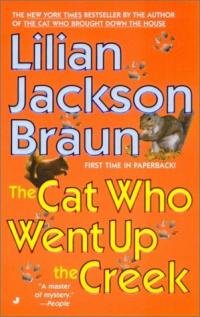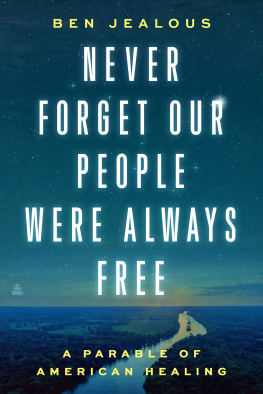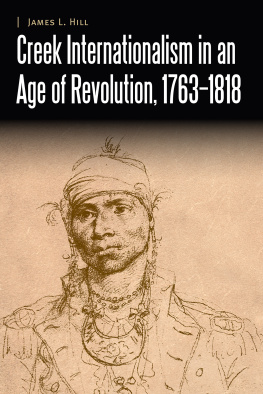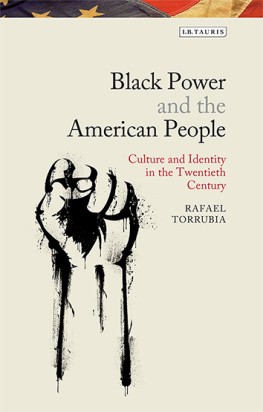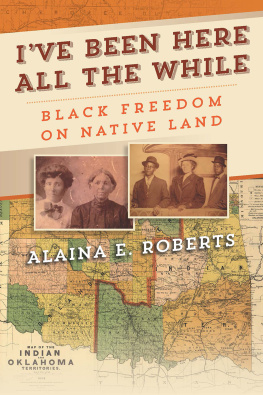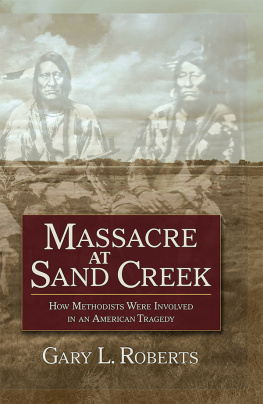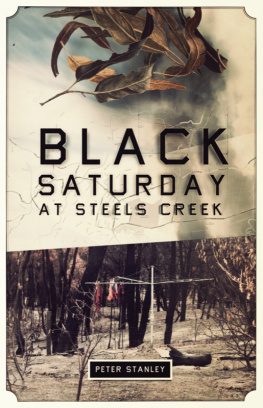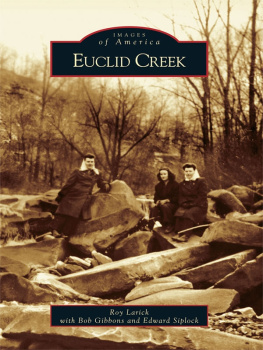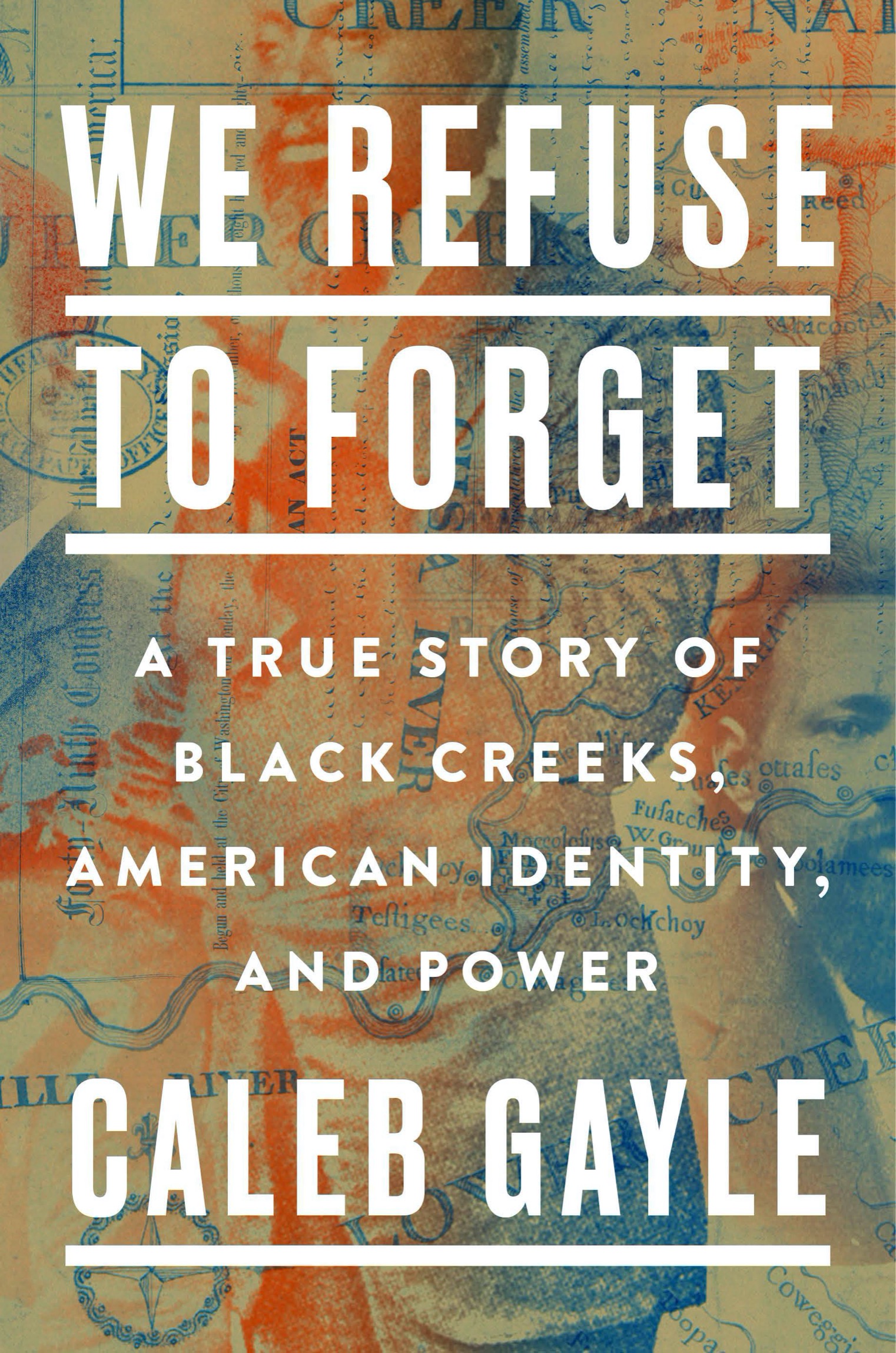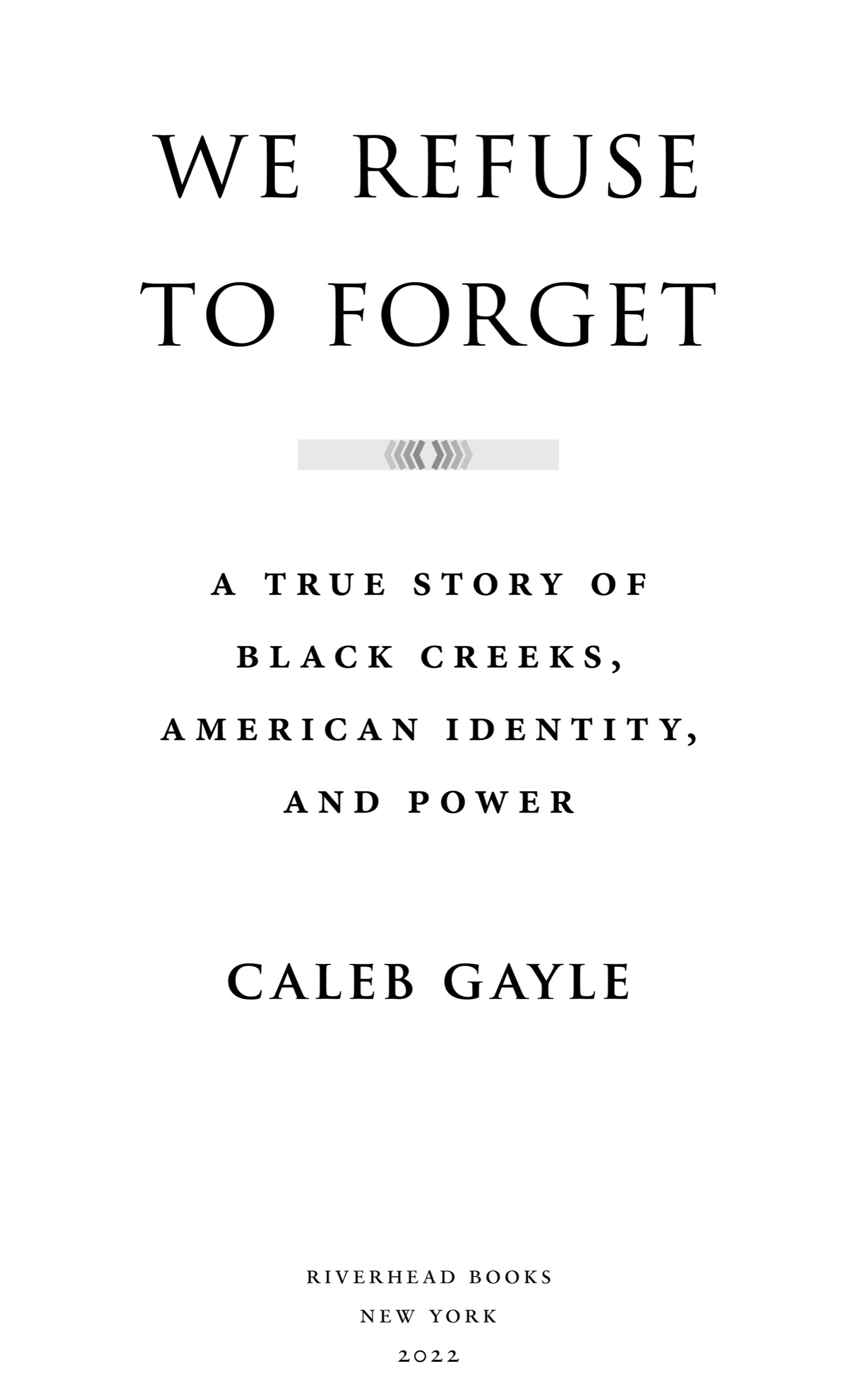
RIVERHEAD BOOKS
An imprint of Penguin Random House LLC
penguinrandomhouse.com

Copyright 2022 by Caleb J. Gayle
Penguin Random House supports copyright. Copyright fuels creativity, encourages diverse voices, promotes free speech, and creates a vibrant culture. Thank you for buying an authorized edition of this book and for complying with copyright laws by not reproducing, scanning, or distributing any part of it in any form without permission. You are supporting writers and allowing Penguin Random House to continue to publish books for every reader.
Riverhead and the R colophon are registered trademarks of Penguin Random House LLC.
Library of Congress Cataloging-in-Publication Data
Names: Gayle, Caleb, author.
Title: We refuse to forget : a true story of Black Creeks, American identity, and power / Caleb Gayle.
Description: New York : Riverhead Books, 2022. | Includes index.
Identifiers: LCCN 2021053867 (print) | LCCN 2021053868 (ebook) | ISBN 9780593329580 (hardcover) | ISBN 9780593329597 (ebook)
Subjects: LCSH: Creek IndiansMixed descent. | Creek IndiansTribal citizenship. | Creek IndiansEthnic identity. | BlacksRelations with Indians. | Muscogee (Creek) NationHistory.
Classification: LCC E99.C9 G36 2022 (print) | LCC E99.C9 (ebook) | DDC 975.004/97385dc23/eng/20211105
LC record available at https://lccn.loc.gov/2021053867
LC ebook record available at https://lccn.loc.gov/2021053868
Cover design: Lauren Peters-Collaer
Cover images: (Portrait of Silas Jefferson) Photograph detail from The Southeastern Indians by Charles Hudson / Courtesy of the Smithsonian Institution; (Portrait of Legus Perryman) The Beryl Ford Collection / Rotary Club of Tulsa, Tulsa City-County Library and Tulsa Historical Society
Book design by Meighan Cavanaugh, adapted for ebook by Maggie Hunt
pid_prh_6.0_140138093_c0_r0
For Peanut, for the fam, and for those whose stories are yet to be told
contents
INTRODUCTION
I Got Indian in Me
It seemed that to capture the multiplicity and contradictory nature of this past, I would have to tell at least two storiessketch two histories, enter two worlds, enlist two purposes, and sound two calls for justiceat once.
Dr. Tiya Miles
My Jamaican family moved from New York City to Tulsa, Oklahoma, in the late 1990s with few expectations of running into a Black person. In a place that at the time was far less Black than the New York we had left, we were desperate to find people whose skin resembled ours in the institutions that could make us feel at home. Soon after moving, my parents found a Black church in North Tulsa, the part of the city where most of the Black people live and the place where seventy years earlier Black Wall Street once stood tall and sprawled wide.
When I was a kid there, most of these Black folks, especially those who had some history in this buckle of the Bible Belt, were known to say a peculiar, indelicate phrase that now sounds so familiar: I got Indian in me. Their ancestors likely included people who had called one of the Five Nations home. I didnt know it then, but the Five Nations were actually called Five Civilized Tribes, an even more indelicate way of designating the Cherokee, Choctaw, Chickasaw, Creek, and Seminole Indians in Oklahoma since at least 1866. But the kids whod say that likely did not know this history, and neither did I. They passed as simply Black. At least I thought they did.
As a child, I thought that Black people in America came from only a few places. From Africa, and recently. From a Caribbean country (like my parents), also recently. Orby way of slave shipsfrom the African continent hundreds of years ago. I assumed the kids who said I got Indian in me were spreading myths or trying to explain why their skin was somewhat lighter and their hair a bit curlier than mine.
But I dismissed these ideas too early. Those kids didnt know the historical power they wielded in that phrase because what they were saying was a simple sentence born of a strange, forgotten history, one hard to imagine in the bright bustle of turn-of-the-millennium America. Even in the second decade of the twenty-first centuryas Oklahoma fights over land, as courthouses hear challenges over identity, and as Congress is called to admit a new Cherokee representativeit is hard to grasp.
But it is true.
What my young friends didnt know when they boasted about their DNA was that their Native and Black ancestors walked hundreds of miles together from the southeastern United States to reach what became Oklahoma. Nor did they know that some of these Black ancestors came as slaves, others as adopted citizens, and still others as fully recognized members of the Creek Nation.
And Im willing to bet that none of them ever heard the name of one Black man, a former putative slave who walked the Trail of Tears, a man dubbed Cow Tom by his former owner, a Creek chief. Like countless Native Americans, Cow Tom made that long, dangerous trek before he ultimately rose to leadership within the Creek Nation. In fact, it was Cow Tom who kept my friends Creek identity intact when he negotiated an 1866 treaty with the U.S. government, an agreement that included citizenship rights for all Black people within the Creek Nationwhether slave, adopted, or free.
It may seem odd that a son of Jamaican parents would find his way inside American history, especially inside the history of Black people about whom youve likely never heard in a state youve likely never visited.
Like all history, how it started wasnt how anyone expected it to end.
One day in 2019, I was sitting in the New York office of the British newspaper The Guardian. I had worked there as a writer for four or five months. On this day, I was jostling between empty rooms and unoccupied desks while more senior writers and editors went to meetings, lunches, and vacations.
I had no story on the books, and my editor and I had a meeting soon to figure out what Id write next. I sat at my computer and typed www.tulsaworld.com into my web browser, not because I was looking for inspiration but because I wanted a reminder that people could cover news and write stories about places and people most of the world didnt care about. What came up across the top of the Tulsa Worlds home page were familiar faces and a story that claimed that the Black people in the accompanying picture had been members of a Nation that wasnt the United States and had freedom that their ancestors had given them in the Creek Nation but not in the United States.
I was intrigued and called some friends I grew up with, many of whom had told me when we were kids that they were part Indian. I knew I had a story, but I didnt realize that the piece Id eventually write for The Guardian would lead me on a journey that reconfigured my notions of identity, race, and belonging.
Looking back, it is odd that I wrote a story about Oklahoma, a place I wanted to forget and a state whose mere mention often prompted any friend from anywhere else to ask, Where is Oklahoma again? In telling you about the place that became my home, I can tell you about America and how America fashions its identity. And if this story has shown me anything, its that there is nothing simple about who you are or where you come from. Like the people on the front page of the

